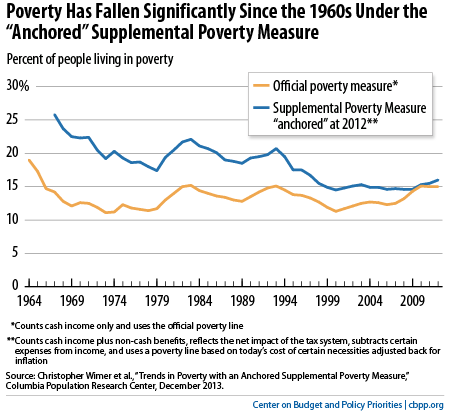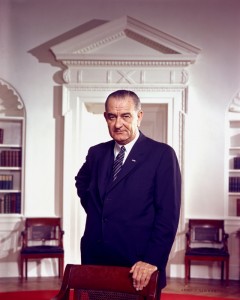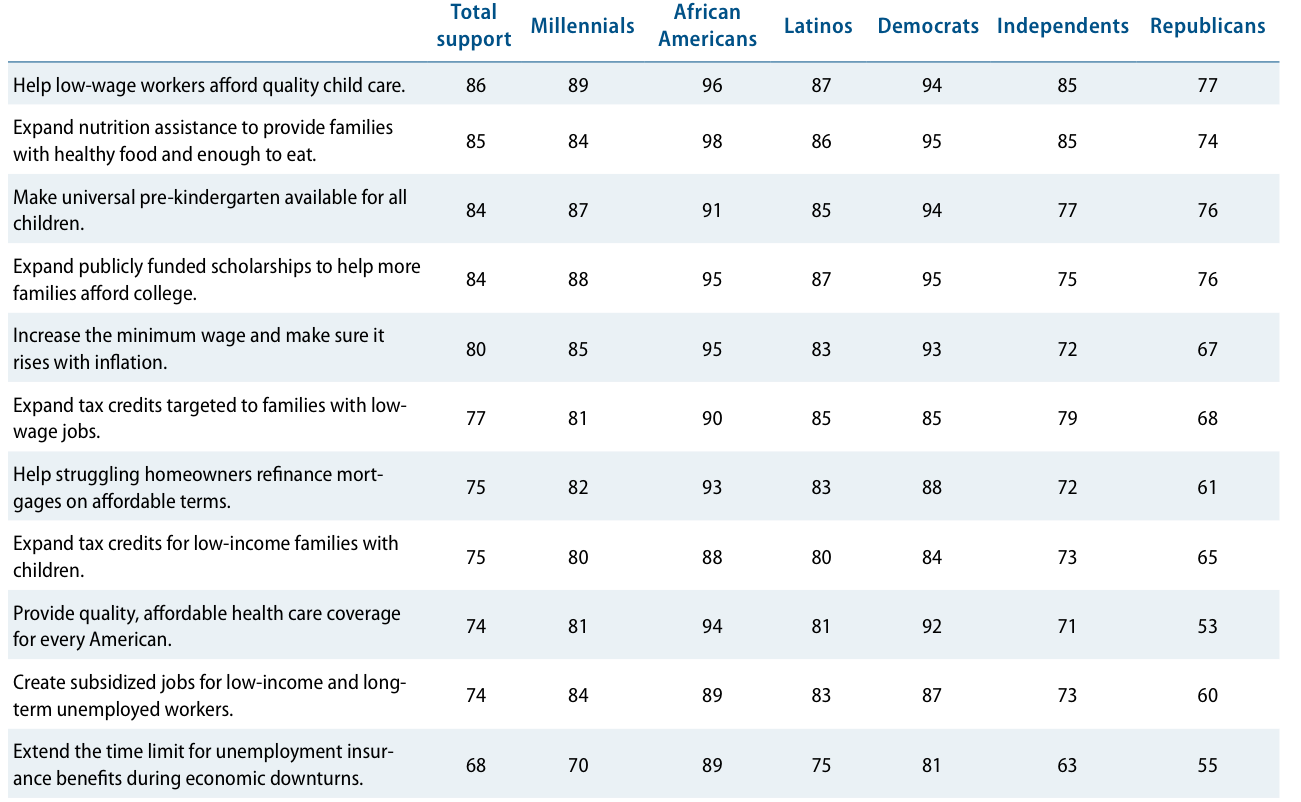But a recent Columbia University analysis shows that politics aside, the Johnson-era programs did work. And new polling by the Center for American Progress, a liberal think tank, indicates that Americans want more programs to combat poverty.
Study says the war worked
The New York Times noted that “the poverty rate has fallen only to 15 percent from 19 percent in two generations.” But those figures are derived from the government’s official poverty measure, developed during the Johnson years and in use since then. That measure is considered by many policy analysts to be cripplingly outdated. “Trying to compare poverty in the 1960s to poverty today using the official measure yields misleading results; it implies that programs like SNAP (formerly food stamps), the Earned Income Tax Credit (EITC), and rental vouchers — all of which were either small in the 1960s or didn’t yet exist — have no effect in reducing poverty, which clearly is not the case,” write Arloc Sherman, Sharon Parrott and Danilo Trisi at the Center for Budget and Policy Priorities.
The Columbia study finds that a new poverty measure used by the Census Bureau reveals a greater margin of success for Johnson’s efforts. Using the Supplemental Poverty Measure — a more accurate and up-to-date metric first implemented by the US Census in 2009 — the Columbia researchers found that safety net programs had a significant effect: They found that the poverty rate fell from 26 percent in 1967 to 16 percent in 2012 — a decrease of almost 40 percent.

The Columbia researchers also confirmed that poverty among elderly Americans decreased substantially in the last 50 years, and that existing safety net programs play an important role in lifting children out of poverty.
Americans want more anti-poverty programs
In a separate study — released by the Center for American Progress and Half in Ten, a campaign dedicated to reducing poverty by half within 10 years — researchers analyzed new polling on American attitudes toward poverty. They found that the majority of Americans saw poverty as a problem, often overestimating its pervasiveness, and expressed empathy for those dealing with it.
Nearly 80 percent of Americans agreed with the statement “most people living in poverty are decent people who are working hard to make ends meet in a difficult economy,” and nearly as many agreed that “the primary reason so many people are living in poverty today is that our economy is failing to produce enough jobs that pay decent wages.” About 57 percent thought that “children born into poverty in America today are likely to remain poor for the rest of their lives.”
Regardless of political alignment, 86 percent agreed that the government was responsible for taking care of the poor and a majority of Americans expressed support for programs such as expanded tax credits, child care programs and universal pre-kindergarten, among others.
The politics of poverty
With the War on Poverty anniversary claiming headlines, and Pope Francis drawing international attention to growing income inequality and the plight of the poor, politicians are scrambling to make their positions known… or, in some cases, to take a position. Philip Rucker and Robert Costa report in The Washington Post that…
…there is deep disagreement among Republican leaders and strategists over whether to embrace an economic-mobility agenda in the 2014 midterm campaigns. Some Republicans are wary of doing so, seeing it as playing on Democrats’ home turf, and think they are better off drawing voters’ attention to the rocky rollout of the health care law and other problems plaguing Obama.
One Republican who has decided to dive into the fray is Florida Sen. Marco Rubio, who is scheduled to deliver remarks critiquing the War on Poverty later today. The Hill reports that his speech on poverty, formerly an issue which Rep. Paul Ryan seemed to carry exclusively for Republicans, is an attempt to “reposition” himself after becoming a poster child for the failed bipartisan push for immigration reform last year, an effort the conservative base never embraced.
“Instead of continuing to borrow and spend trillions of dollars on government programs that don’t work, what our nation needs is a real agenda that helps people acquire the skills they need to lift themselves out of poverty and to pursue the American dream,” Rubio said in a YouTube video previewing his remarks. He suggested that a fuller commitment to such GOP priorities as repealing Obamacare and reducing the national debt would work better than the safety-net programs currently in place. “Isn’t it time to declare big government’s war on poverty a failure?” Rubio asks.
The problem of perception here, Michael Tomasky writes at The Daily Beast, is partly “the fault of liberal rhetoric. Johnson and others would speak of eradicating poverty, and of course eradicating poverty is impossible, and when it didn’t happen, conservatives were able to say, ‘See?'”
Responding to the claim that the War on Poverty had failed, Peter Edelman, poverty advocate and director of the Center on Poverty, Inequality and Public Policy at Georgetown University, told reporters, “it’s just not true.” Edelman said Republicans like Rubio and Ryan have yet to offer a solution that anti-poverty advocates can embrace: “There’s a complete burial of the heads in the ground when we have over a million people losing their unemployment insurance.”




